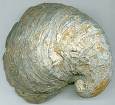Tiredness, fatigue, whatever, is a feature of the lives of many people with chronic health problems. Today I was asked, by someone genuinely interested, and for all the right reasons, what sort of tiredness do I have, what is fatigue and what makes it different to extreme tiredness ?
We discussed feeling tired, feeling drained, feeling heavy; the tiredness from physical exertion like power-walking, swimming, completing (37 years ago) a 24 mile all night Oxfam fund-raising walk; the muscle tiredness from standing all day, gardening, hedge-clipping, ironing; sleepy tiredness and limb tiredness and tiredness from being bored. The other person described the extreme physical tiredness from building cob walls, winching in sails, lambing, the things that person has done.
None of those things, that I have done, that that person has done, are quite like my daily fatigue. My fatigue, and perhaps yours, is profound. Some days it is quietly next to me or profoundly accompanying me, other days it is sat on top of me and I cannot move without dragging it along with me. When it is exacerbated by systemic inflammation it is the weight of a cape draped from my shoulders and a skirt hung from the hips, made of lead, heavy lead, hot molten lead, leaden. When it is masked by a systemic steroid injection, for two months it is merely a pain, that does not stop me from doing too much, and it just hurts.
Synchronistically, that question to me today about my tiredness, linked with The Goldfish's post I read yesterday. Relevant now, is that if I stop to recall how to put in the link to The Goldfish's post, I will loose the thread I am currently pulling out from my brain and, lost forever, it will not be recoverable. That is why I sometimes do not do things that I can do, and have done before. I cannot do them again without going back to them to revise, or even sometimes, to re-learn them.
Many people with Systemic Lupus have 'brain fog', and those are the Lupus patients who do not have Central Nervous System Lupus. We keep detailed reminder diaries, carry Filofaxes, rely on laptops, post-it notes, lists. We write explanations for ourselves of how we did something today in case we do not know how to do it tomorrow. We have a folder with the title: My How To Do. We have visual reminders because our brains do not always retain the memory of what we have, what we know. We continue to be who we are if we were originally able, creative, intelligent, capable, because we make these extra efforts to continue to be ourselves. We consider ourselves fortunate to be able to do so.
Physical fatigue creates brain fatigue. Physical tiredness renders me unable to speak coherently. Sometimes I am in the middle of something, and know it is about to happen, so I can take time out briefly, to recover, to stop getting to that stage. Sometimes I have reached that stage but, because I live alone, I do not know I have reached that stage until I answer the phone, or the door, and the words the other speaks make no sense to me, they flow into my brain, where they do not get sorted into sentences, but remain a sense-less jumble of sounds. Or sometimes my words don't flow from my brain to my mouth, or the wrong words flow, or the words flow from the brain (I am thinking I know what I am saying) but my mouth doesn't say it as I am thinking it, or does not keep up and my speech is slurred. So, in those situations I just say: I am sorry, I am tired.
People understand; often they get tired. They can relate to my explanation. It is enough for the few minutes I am in contact with them, that they understand that. Others that are in contact with me for longer, need the longer explanation. Also, I need the longer explanation, to remind me on down days why I am like this, that it is real, that I have this reason, this excuse. This is written now, in the real time, fixed time, of a post on my blog, for those times in the future when I need something concrete and real outside of me, to tell me where I am. I can come back and re-visit, revise, where I am, what I am.
Its late, many people went to bed ages ago, why don't I go to bed and be sensible then I won't be so tired ? I go to bed late at night, I sleep late in the morning. At this late hour it is quiet, the world outside my immediate space is empty. There is no noise outside my room, my cottage. Just the owl. Just the creature in the loft or in the cavity wall having a good scratch, its elbow banging against a hard surface. You would not hear it, my Meniere's related hyper sensitive hearing does. It really is quiet. The tinnitus is subsiding. So I can think straight without outer, or inner, noises jumbling my brain. In the daytime the world is busy. The milk, the post, the farm vehicles, the birds, the neighbours, the commuters, the dog walkers; all make a noise, all increase the tinnitus white noise, many have the potential of entering my world, through my door, through my window, all take up energy, take away energy from my brain. At this late hour its just me and you via my laptop.
Two days a week the transient Lupus related brain fog gets denser with the neuro-toxic effects of the weekly drug that manages Lupus, and then I go deep; the me inside my head is negative. The world is a different place that is dark, has the potential never to get lighter, and I really ought to take notice of the dangers and dark facts that I only know, that only I know, on those two days every week, and act accordingly. I am usually too physically tired, drained, to act, so it passes.
Your drug sheet may say: do not operate machinery if affected; my memo to self says: try to take no notice, it will pass.
Additionally, any day when I am physically very tired (as opposed to averagely knackered) I am depressed in spirit, in outlook. Physical health related tiredness dampens my mood in all aspects, dampens down the jolly te-he-ness that comes naturally to me. I become older than I am, rather than my usual sense of feeling younger than I am.
When very very tired, I cannot let anything from outside, in, because I don't react to it naturally, as me. Music, television, books of words, books of pictures, friends, companions, letters, blogs; I cannot rely on reacting to them safely. Then the only thing I can safely take in is looking outside, through the window, or being outside, in the air, looking at or being in, calming nature - which is safe, consists of colours that are good for the mood; blues, greens, and which does not intrude on me, or ask anything of me. It just is. Outside in the world the inhabitants of nature ask nothing of me, they just are.

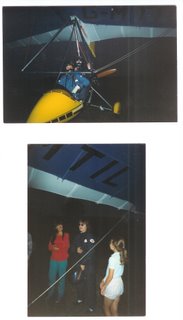
 Another bit of kit from this era was the telex machine. This picture from www.samhallas.co.uk, not from my album.
Another bit of kit from this era was the telex machine. This picture from www.samhallas.co.uk, not from my album.
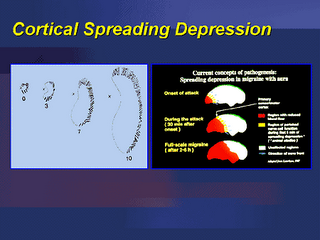
 These lovely clay figures of ladies dancing in a circle around a lyre player, come from Palaikastro and can be found in the Herakleion Museum in Crete. My information is from the archeological guide purchased at the museum.
These lovely clay figures of ladies dancing in a circle around a lyre player, come from Palaikastro and can be found in the Herakleion Museum in Crete. My information is from the archeological guide purchased at the museum.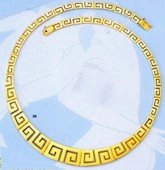
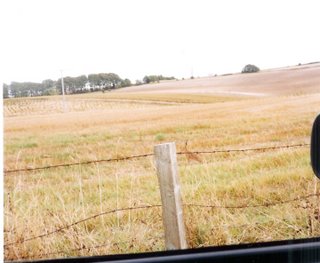

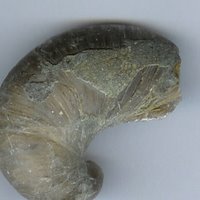 Question 4 ~ I found a devil's toe nail
Question 4 ~ I found a devil's toe nail